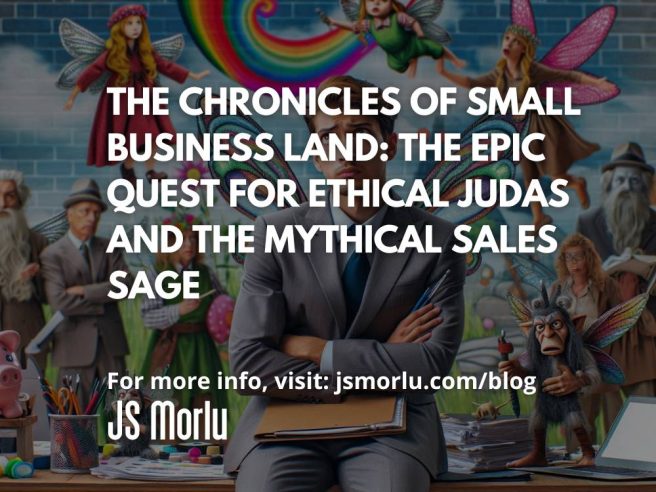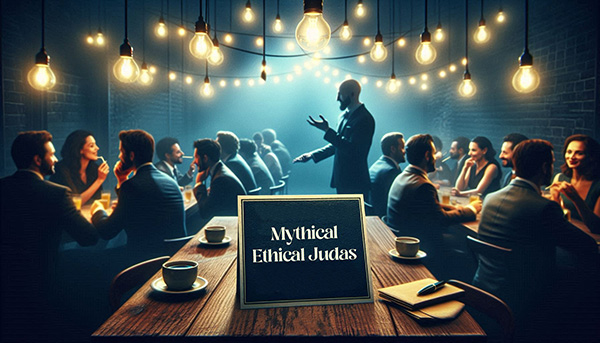By: John S. Morlu II, CPA
Introduction
Once upon a time, in a far-off land that might seem suspiciously similar to the one you find yourself in today—give or take a few office plants—there existed a peculiar and chaotic realm known as Small Business Land. This wasn’t a typical kingdom, mind you. No knights, no kings, no fire-breathing dragons guarding treasure. Instead, the place was packed with something far more formidable: small businesses. Tiny empires, each filled with quirky products, eccentric staff, and, let’s be honest, enough office drama to rival a season finale of The Real Housewives. If you think your office is strange, just wait until you hear what goes on here.
The driving force of Small Business Land was a curious mix of dreams, hard work, and a dangerously high amount of caffeine. Entrepreneurs from all corners of the kingdom would rise each morning with fresh energy, fully convinced that today was the day they would finally close that deal—the one that would turn them from “barely surviving” to “thriving and winning Entrepreneur of the Year.” They’d brew their third cup of coffee by 9 a.m., stare at their laptop screens with the intensity of a hawk eyeing its prey, and tell themselves, “Today’s the day I become a legend.”
Sadly, the reality was more tragic than they dared admit. Despite having what could only be described as amazing products that people should have absolutely loved—seriously, they were ready to sell products as revolutionary as reusable napkins for toddlers, heated socks for summer wear, and dog food that also worked as plant fertilizer—they couldn’t close a sale if their lives depended on it. Not even a single measly deal. These businesses were like teenagers with crushes, endlessly flirting but never getting to the part where they actually ask someone to the dance. They had plenty of leads, sure, but when it came time to get a signature on the dotted line, they would freeze up like a Wi-Fi connection during a video call.
To be clear, this wasn’t just a matter of bad luck. Oh no. The problem was far more widespread. Small Business Land was drowning in leads. A rich ocean of potential customers was just out of reach, and yet most businesses here couldn’t close a sale any better than a fortune teller could predict the winning lottery numbers. They had become experts at everything but selling. They could design logos with sleek minimalism, craft websites with stock photos of people who looked way too happy in boardrooms, and even master the art of posting motivational quotes on Instagram. But when it came to actually closing a deal? Forget it. They might as well have been selling life jackets at a lifeguard convention—useful, but who’s buying?
And this, my dear reader, brings us to the stars of our story: the not-so-fabled, Underdog Industries. Their motto? “Hey, we try!” (Not exactly confidence-inspiring, but it’s honest). If Underdog Industries were a person, it would be that guy at a party who shows up with a tray of store-bought brownies, makes awkward small talk for 15 minutes, and leaves before dessert. Enthusiastic, well-meaning, but a little… underwhelming. They had a semi-functional coffee maker (a symbol of perseverance, if you ask me), employees who mostly showed up on time (give or take a lunch break or two), and a pile of business cards so thick it could be mistaken for a phone book.
And yet, despite having a product so good it could practically sell itself (at least, according to their CEO), they couldn’t even close a deal on free samples. Their lead conversion rate was lower than the number of people still using fax machines. They had the business equivalent of someone who gets all the Tinder matches but ends up staying home on a Friday night, binge-watching Netflix alone.
What Underdog Industries really needed, and what every business in Small Business Land secretly craved, was something far rarer than an actual good idea at a brainstorming meeting: an Ethical Judas. Now, if that sounds like an oxymoron, well, that’s because it kind of is. But stick with me. The Ethical Judas is the kind of salesperson every business wishes they had—someone who could sell ice to Eskimos, solar panels in a blackout, or convince you that what you really need in life is a $500 blender that also doubles as a Wi-Fi router. They were charming, persuasive, and, despite their slightly shifty nickname, still had enough morals to not totally swindle their customers (just… gently nudge them toward a life-altering purchase).
Finding an Ethical Judas in Small Business Land, however, was like trying to find a unicorn in a sea of office cubicles. They were elusive, slippery, and constantly in high demand. Some said they had the charisma of a politician before a scandal and the closing skills of a professional poker player. Others claimed they had mystical powers—like the ability to hypnotize potential clients by whispering words like “ROI,” “limited-time offer,” and “customized solutions” in just the right tone. Legends tell of one Ethical Judas who managed to sell heated blankets to a tropical resort and another who convinced a company’s board to buy their own stock at a premium price. But like all legends, it was hard to know what was real and what was just desperate fantasy.
Underdog Industries, however, had no such magical closer. Their sales team was more like a group of well-meaning Golden Retrievers—friendly, eager to please, but prone to distraction and not exactly trained to go for the kill (in a sales sense, of course). Their approach to closing deals was… well, let’s just say it left a lot to be desired. They would “circle back,” “touch base,” and “keep you in mind for future opportunities,” but when it came to getting a commitment, they were about as effective as a screen door on a submarine.
The CEO, in a fit of desperation, even tried to implement a new sales strategy called “Operation Close The Damn Deal.” This involved weekly pep talks, motivational quotes plastered on every available surface, and an aggressive plan to convert at least 2% of leads by year’s end. Spoiler alert: it didn’t work. All they got were higher printer ink bills from printing out so many inspirational posters and exactly zero new customers.
So what’s the moral of this tale, you ask? The ultimate lesson of Small Business Land? It’s simple: having great products and lots of leads doesn’t matter if no one knows how to actually seal the deal. You can have all the website clicks, all the Instagram followers, and all the freebie samples in the world, but unless you’ve got someone who can take a lead from “I’m interested” to “Take my money!”, you’re just another dreamer with a full coffee cup and an empty bank account.
The Ethical Judas is the missing link—the sales savant who understands that closing isn’t just about knowing your product; it’s about knowing your customer, guiding them through the journey, and making them feel like this is the deal they’ve been waiting for all their lives. It’s not manipulation—it’s persuasion with a purpose. It’s the art of making customers feel like they’ve won just by saying yes.
So, in the end, what every small business needs is not just another marketing strategy, not just more leads, but that rare, magical figure who can close deals like their life depended on it. Because in Small Business Land, if you can’t close, you’re just a hobbyist with a side hustle, still hoping one day to play with the big boys.
Chapter 1: The Trouble with Teamwork
Underdog Industries had built a reputation for its quirky and offbeat products. From glow-in-the-dark paperclips that turned office work into a low-key rave, to ergonomic back scratchers designed for those hard-to-reach itches, and self-watering plant pots that seemed to have a personality of their own—sometimes a little too enthusiastic about hydrating their green friends. Customers found these inventive ideas charming, but they weren’t exactly tripping over themselves to hand over their hard-earned cash.
At the helm of this eccentric ship was Bob, a beleaguered captain navigating the stormy seas of small business management. His crew, though colorful, often seemed more like a collection of nautical misfits than a well-oiled team. Here’s a closer look at his motley crew:
- Chad, the “Sales Guy”: Chad was less of a sales guru and more like the office doorbell. He greeted people with a level of enthusiasm that could only be described as “over-caffeinated puppy,” and then waited expectantly for something—anything—to happen. His sales strategy consisted of a series of vague “touching base” calls that would make a tortoise look like a cheetah in a sprint. If sales were a race, Chad was perpetually at the starting line, waving at passing competitors.
- Marge, the Office Manager: Marge was a formidable force in the realm of passive-aggressive post-it notes. Her desk was a kaleidoscope of organized chaos—scattered to-do lists, motivational memes, and sticky notes that could intimidate a librarian into silence. Marge had a knack for extracting free shipping with a single raised eyebrow and could track down lost invoices with the tenacity of a bloodhound. However, her interpersonal skills were as well-developed as a rusty can opener. Her ability to “be nice” to vendors was as mythical as a dragon in a boardroom.
- Gary, the “Idea Person”: Gary’s days were split between brainstorming sessions that were more like creative daydreams and meticulously avoiding actual work. He was a maestro of buzzwords, spinning phrases like “strategic synergy” and “holistic approach” while deftly sidestepping deadlines. His contributions to meetings were a constant stream of jargon and motivational clichés that meant, in layman’s terms, “I’m not doing the real work but I’ll happily offer endless theories on why we should.” Gary’s idea of productivity was suggesting a “pivot” while steering clear of any actual tasks.
- Sophie, the Intern: Sophie ran the company’s social media with the zeal of a teenager wielding their first smartphone. Her posts about the latest products were legendary, complete with selfies that could rival a Hollywood star’s red carpet moment. However, her eagerness to get hired full-time was almost as famous as her posts. She was known for slipping “So, when can I get hired full-time?” into every conversation, usually as Bob was in mid-sip of his coffee. Despite the social media buzz, lead conversions were as elusive as a unicorn hiding in a haystack.
Leads were aplenty, thanks to Sophie’s social media prowess. Her posts drew hundreds of likes and comments, creating an online buzz that could make a marketing guru weep with joy. Yet, when it came to closing deals, the office atmosphere resembled a deserted ghost town. If you listened closely, you might have heard the faint sound of tumbleweeds rolling through their CRM software, echoing through the silent void of missed opportunities.
Bob frequently checked in with Chad, hoping for a breakthrough. “How’s it going with the Acme deal?” he’d ask, with the same hopeful tone as a parent asking their child about their school day.
Chad’s response was always the same, delivered with the sincerity of a well-worn bedtime story: “We’re touching base. I think they’re just about ready. Just a few more follow-ups.” Chad’s approach was as consistent as a broken record, repeating the same line for three months straight. It was like watching a slow-motion replay of a car crash—horrifying yet impossible to look away from.
On a particularly gloomy day, after another fruitless update, Bob threw up his hands in exasperation. “We have everything: innovative products, interested customers, and a semi-functional coffee machine. What’s missing?” His frustration was palpable, his coffee barely a consolation.
And so, dear reader, we arrive at the heart of Small Business Land’s greatest flaw—the missing piece of the puzzle that was more than just a quirky product or a well-intentioned team. It was the absence of an Ethical Judas—a sales magician with the uncanny ability to sell ice to an Eskimo and make the Eskimo believe it was their idea all along. The quest for this mythical figure would set the stage for a journey that would reveal that the true power of sales lay not in finding the perfect closer but in uncovering the hidden potential within the team itself.
Chapter 2: Enter Ethical Judas
In the dimly lit backrooms of small business networking events, where business cards were exchanged like sacred relics and people whispered in hushed tones, there was talk of a mythical figure known only as Ethical Judas. This fabled creature was the unicorn of the sales world—a deal-closing, contract-signing marvel who could persuade even the most hardened skeptic to part with their cash.
Ethical Judas was no villain; unlike the biblical Judas, who got a bad rap for betrayal, this Judas wasn’t out to sabotage your company. Instead, they were the superhero of sales, the Houdini of contracts, the charming negotiator who could sell sand to a desert wanderer and have them thank you for it.
Legend had it that Ethical Judas could sell ice to an Eskimo and leave the Eskimo feeling as if they had just been gifted a lifetime supply of tropical vacations. They had the suave charisma of a movie star, the persuasion skills of a diplomat, and the subtlety of a ninja in a tuxedo. When Ethical Judas spoke, wallets didn’t just open—they flew open with a whoosh of admiration.
Bob, poor Bob, came to this revelation after a particularly painful episode of Chad’s sales calls. It was like watching a car crash in slow motion—utterly gripping but deeply distressing. The latest call went something like this:
Chad: “Hi, yeah, just calling to follow up on the quote. Did you get it?”
Customer: “Yes, we did. We’re still thinking about it.”
Chad: “Okay, well, whenever you’re ready, we’re here.”
Customer: “Right. We’ll get back to you.”
Bob’s reaction was a mix of despair and disbelief. It was akin to witnessing a comedy of errors where every joke fell flat. Chad’s approach was about as effective as trying to mop up a flood with a single paper towel. It was like watching someone try to catch a greased pig with a butterfly net.
Bob knew he needed more than just a good sales strategy—he needed the sales equivalent of a magic wand. He needed an Ethical Judas. This was the person who could turn a “maybe” into a “yes,” who could charm the socks off a statue, and who could make even the most jaded client feel like they were receiving the deal of a lifetime.
The search for Ethical Judas became Bob’s personal quest. He envisioned this mythical being with a golden sales pitch and a twinkle in their eye, capable of turning even the most mundane product into the hottest item on the market. Bob knew that if he could just find this rare creature, the fortunes of Underdog Industries would change overnight.
Little did Bob know, the search for Ethical Judas would lead him down a path of eccentric interviews, dubious claims, and a series of comically failed attempts at finding the perfect sales savant. But that’s a story for another chapter. For now, Bob’s greatest challenge was accepting that sometimes, even a mythical figure like Ethical Judas wasn’t enough. Sometimes, you had to make your own magic.
Chapter 3: The Search for Ethical Judas
Bob wasn’t one to give up easily. After all, running a small business had taught him that perseverance was a key ingredient in the recipe of success—right alongside caffeine and mild panic. Armed with new resolve, he put out a job ad that was bound to attract only the best and brightest sales talent. It read:
“Seeking Sales Guru Who Can Close Deals. Must Be Able to Sell Water to a Fish.”
The responses came flooding in like the aftermath of a “Going Out of Business” sale. It didn’t take long before Bob realized that while his ad was a stroke of genius, it was also a magnet for, well… let’s call them unique individuals.
The first applicant, Fred, opened his cover letter with a bold claim: “I can telepathically close deals.” Intrigued, Bob read on, only to discover that Fred’s psychic powers were highly conditional. Apparently, this mystical skill only worked when Mercury was in retrograde—so roughly four times a year. Bob briefly considered hiring Fred just to witness him try to Jedi-mind-trick a client, but the idea of explaining the company’s sales slump based on planetary alignments didn’t seem like a winning strategy.
Then there was Tammy. Tammy’s resumé proudly declared that she’d “sold soul-insurance to vampires,” which was an impressive feat if only Bob’s clients were the blood-sucking undead. She insisted that her sales skills were “supernatural,” and while Bob appreciated her enthusiasm, he was looking for someone who could close deals with real people—not creatures from folklore. Besides, he didn’t want to risk being sold something he didn’t need, like a garlic subscription or eternal life insurance.
And who could forget Nick? This guy came in with a swagger and a story that would be hard to beat: “I once sold a vacuum cleaner to a guy living in a tent,” he boasted. While Bob couldn’t help but admire the sheer audacity of the claim, he had questions. Was this a case of extreme overachievement or an example of sales so aggressive it bordered on predatory? Either way, Nick didn’t quite fit the mold of Ethical Judas; he seemed more like “Pushy Pete,” the kind of salesperson who’d upsell a penguin a fan.
Bob’s inbox quickly became a circus of eccentricity. One applicant claimed to have “closed deals with telemarketers,” which sounded like a superpower, but Bob wasn’t sure he was ready to hire a professional masochist. Another hopeful said they had “persuaded a cat to use a treadmill,” and while Bob admired their patience, he questioned how this skill translated into B2B sales.
As Bob sifted through the bizarre array of applications, his hope began to wane. He envisioned Ethical Judas as a smooth, sophisticated deal-closer, not someone who read horoscopes to figure out their quota for the quarter. With each new resumé, he began to wonder if Ethical Judas was real at all. Maybe the whole thing was just a tall tale, a mythical creature like Bigfoot or a competent tech support agent.
Still, Bob wasn’t quite ready to give up. Somewhere out there was the salesperson of his dreams—or, at the very least, one who didn’t believe vampires were a viable target market. And so, the search continued, with Bob clinging to the hope that soon, his very own Ethical Judas would appear. The question was: would they come riding in on a unicorn or a used car they somehow convinced him to buy?
Chapter 4: A Deal with the Devil?
In the bustling realm of corporate oddities, Bland Co. was the reigning champion of mediocrity. Their product line? Beige-colored widgets, each one as unremarkable as the last. Their website was a minimalist’s dream—featuring stock photos of people high-fiving like they’d just won the lottery. Yet, despite their plain vanilla offerings, Bland Co. was inexplicably thriving.
Bob’s bewilderment reached a crescendo when he stumbled upon Bland Co.’s CEO, Karen, at a networking event. The event was one of those classic setups where everyone pretends to enjoy a dry cocktail while discussing business jargon that no one actually understands. Karen, with her perfectly coiffed hair and an air of unearned superiority, was in her element. Bob, clutching a lukewarm mimosa, couldn’t help but feel a pang of jealousy mixed with curiosity.
“How are you guys closing so many deals?” Bob asked, trying to mask his incredulity. “You sell beige widgets.”
Karen’s smirk was so smug it could have been trademarked. “We hired a closer,” she said, as though she were revealing the secret recipe for Coca-Cola. “Ethical Judas.”
Bob’s eyes widened. “You mean these mythical figures are real?” He’d heard the legends of Ethical Judas, but he’d always thought they were just fairy tales told to comfort desperate entrepreneurs.
“Oh yes,” Karen replied, her voice dripping with condescension. “They’re as real as my designer handbag. But they’re not cheap. I had to offer stock options, a brand-new Tesla, and, believe it or not, unlimited kombucha.”
Bob stared at her, his brain short-circuiting at the thought of unlimited kombucha. Who even needs that much kombucha? It was like trying to bribe someone with an endless supply of—well, a beverage that most people thought tasted like fizzy vinegar.
Karen continued, her tone almost gleeful. “Ethical Judas is quite the catch. They can sell ice to an Eskimo, make your grandmother buy a new smartphone, and even convince a hermit to upgrade his Wi-Fi. But they don’t come cheap. I had to go all out—stock options, a Tesla, and a kombucha fountain in the office. And you know what? It was worth every penny.”
Bob returned to Underdog Industries with a mixture of awe and determination. He didn’t have a Tesla budget, and the thought of a kombucha fountain made his wallet twitch with fear. But he did have Marge’s infamous post-it notes, and if there was anything that could rival the allure of a mythical salesperson, it was Marge’s passive-aggressive reminders.
Marge’s post-it notes had a reputation. They were like miniature motivational speeches with a side of gentle intimidation. “Don’t forget to follow up on that lead, or else,” one might read. Or, “Remember, we have a quota to meet—failure is not an option.” Bob hoped that Marge’s post-its could channel some of the mythical powers of Ethical Judas, or at the very least, motivate Chad to make an actual sales call rather than just “touch base.”
Bob rolled up his sleeves and faced the challenge head-on. The quest for Ethical Judas might have seemed like chasing after a unicorn, but with Marge’s post-it notes, a newfound determination, and a prayer that their CRM system would start working, he was ready to make his own magic happen. If nothing else, he was going to turn Underdog Industries into a powerhouse of sales—beige widgets and all.
Chapter 5: The Ethical Judas in All of Us
Months ticked by, each one bringing Bob closer to a startling realization. The elusive Ethical Judas remained as mythical as Bigfoot, but Bob’s quest unearthed something even more profound: Small businesses didn’t need a legendary salesperson who could charm the pants off a statue; they needed training, focus, and a mindset that could move mountains—preferably without needing an actual mountain.
Determined to make a hero out of his team, Bob set about transforming Underdog Industries into a well-oiled sales machine. First on the docket: Chad, the Sales Guy. Chad had been about as effective as a damp sponge in a water fight, so Bob signed him up for rigorous sales training. This wasn’t the fluff-and-puff variety that left you feeling all warm and fuzzy but achieved nothing. No, Chad underwent a grueling regimen that involved learning the art of deal structuring, mastering the fine line between persistent follow-up and stalking, and perfecting the elusive skill of turning objections into opportunities without sounding like a used car salesman.
Chad’s training was akin to boot camp but with fewer push-ups and more role-playing scenarios. Bob watched in awe as Chad, once as timid as a kitten, transformed into a sales ninja. Chad learned to handle objections with the finesse of a ballet dancer dodging raindrops. The once-sluggish sales calls now had the energy of a caffeinated squirrel.
Next up was Marge, the Office Manager and queen of post-it notes. Bob had her retire her old, passive-aggressive notes like, “Don’t make me come over there” and replace them with tactical reminders that read, “Follow-up on Lead 42—Opportunity Awaits!” Marge’s notes now served as motivational cheerleaders rather than subtle threats. They were strategically placed everywhere: on Chad’s desk, in the bathroom mirror, and even on the coffee machine—ensuring no one could escape the call to action.
Sophie, the social media whiz, was given the task of revamping the company’s digital presence. She took the once-dull social media pages and injected them with a fresh dose of pizzazz. With a call-to-action so compelling it could make a hermit emerge from his cave, Sophie transformed the company’s online presence into a vibrant marketplace. Customers were no longer just browsing—they were practically banging down the virtual doors to buy.
Bob’s epiphany was that the real trick wasn’t finding an Ethical Judas. It was about unlocking the Ethical Judas within each team member. He realized that his quest for a mythical figure was like looking for a unicorn in a haystack. Instead, he needed to foster the magic within his own team.
Under Bob’s guidance, the team learned that sales success wasn’t about having a silver-tongued closer who could sell sand to a desert dweller. It was about becoming relentless in their pursuit of value, building trust, and delivering on promises. Bob embraced the challenge of turning his team into sales superheroes—each one equipped with their own special powers of persuasion and problem-solving.
Soon, Underdog Industries wasn’t just closing deals—they were closing deals with the precision of a Swiss watchmaker. The team had morphed from a ragtag group into a powerhouse of sales and efficiency. They no longer needed to chase after a mythical figure; they had become that figure in their own right.
As Bob looked around at his transformed team, he couldn’t help but smile. The quest for Ethical Judas had been a wild ride, but it led to a deeper truth: Every small business has its own internal sales superstar just waiting to be discovered. All it takes is a bit of training, a lot of focus, and a mindset that refuses to quit.
And so, with a renewed sense of purpose and a team that could sell snow to a snowman, Bob sat back and enjoyed the view. The Ethical Judas wasn’t a mythical creature to be found—it was a state of mind to be embraced. And in that moment, Bob knew they had all become a little bit magical themselves.
Chapter 6: Success at Last
Within a year, Underdog Industries had undergone a remarkable transformation. They had evolved from a company that couldn’t close a deal if it came with a free vacation to a thriving enterprise that was closing over 50% of their leads. No longer did they need to sell ice to Eskimos—after all, why bother when you can show them that their backs will never be itchy again with the company’s ergonomic back scratchers?
Chad, who had once been as effective as a sponge in a flood, had evolved into a sales dynamo. He could now turn a hesitant inquiry into a signed contract faster than you could say “cold call.” Chad’s newfound sales prowess was the stuff of legends—or at least, the stuff of office gossip and high-fives in the break room.
Marge, previously known for her passive-aggressive post-it notes, had embraced her role as the Follow-Up Queen with all the enthusiasm of a caffeine-fueled squirrel. Her post-it notes were now like tiny motivational posters, reminding Chad and the team that opportunities waited for no one. She even started a weekly “Follow-Up Friday,” where she’d hand out gold stars for every deal closed and an extra star for every deal that had been followed up on relentlessly. The gold stars became so coveted that even the office plants seemed to be vying for one.
Sophie’s social media skills had become the company’s secret weapon. Her posts were so engaging they could make a cactus look fascinating. Thanks to her efforts, the company’s social media channels were abuzz with activity, and customers were flocking to them like bees to honey—or maybe like shoppers to a Black Friday sale. Sophie’s selfies with products became so famous that Bob began jokingly calling her the “Selfie Sorceress.”
A particularly happy moment came when Bob officially hired Sophie full-time. As he handed her the new contract, he couldn’t resist a little jest: “Congratulations, Sophie! You’ve just made yourself an official part of the team. And remember, with great power comes great responsibility—especially when it comes to keeping your selfie game strong.”
Bob’s revelation was nothing short of profound. He discovered that every small business had its own version of Ethical Judas—or at least the potential for one. It wasn’t about finding a mythical salesperson who could charm the pants off a statue; it was about unlocking that hidden potential within the team and empowering them to communicate value, urgency, and trust with genuine enthusiasm and skill.
As Bob sipped his fully functional coffee—no longer a temperamental machine but a reliable caffeine dispenser—he looked around the bustling office with a sense of pride. The once-quiet workspace was now alive with energy, creativity, and a touch of friendly competition. The quest for Ethical Judas had come to an end, but the real victory was discovering that the true power of sales—and success—lay within themselves.
The office wasn’t just a place of business anymore; it was a dynamic team of ordinary people achieving extraordinary things. They weren’t just closing deals; they were setting new standards for what a small business could accomplish. The old problems seemed like distant memories, and every challenge was now met with a collective spirit that was equal parts determination and joy.
Bob knew the journey had been anything but straightforward. It had been filled with false starts, eccentric applicants, and moments of profound frustration. But it had also been a journey of growth, discovery, and the realization that success doesn’t come from mythical figures or magical solutions—it comes from nurturing the potential within and transforming ordinary efforts into extraordinary results.
As Bob leaned back in his chair, he took a moment to savor the view. The office buzzed with activity, laughter, and the clinking of coffee mugs. The team was more than just a group of colleagues; they were a force to be reckoned with. And in that moment, Bob knew they had discovered something truly invaluable: the power to succeed was never about finding a mythical hero—it was about becoming one.
Chapter 7: The Moral of the Story
In the whimsical world of Small Business Land, where distractions were as common as coffee breaks and false leads were as plentiful as overused buzzwords, the quest for the perfect closer often seemed like chasing a rainbow while juggling flaming torches. Entrepreneurs dreamt of discovering a legendary figure—a unicorn with a sales pitch so magical it could make even the most skeptical customer whip out their credit card in sheer awe.
But here’s the twist in the tale: there’s no magic bullet, no enchanted amulet, no mythical hero with a sales wand. Success in sales—and business in general—isn’t about finding that elusive unicorn or waiting for the stars to align perfectly. It comes down to the simple, often overlooked fundamentals that are as basic as the first five notes of “Twinkle, Twinkle, Little Star”: training, understanding your product, and relentless follow-up.
Let’s face it: no amount of fairy dust or mythical charm can substitute for the hard work of knowing your product inside out. You’ve got to be able to talk about your back scratchers with the same enthusiasm and precision as an Olympic athlete discussing their favorite sport. Understanding your product isn’t just about knowing its features; it’s about knowing why it’s the best thing since sliced bread (or at least better than a regular back scratcher).
And then there’s follow-up—oh, sweet, sweet follow-up. It’s the art of the gentle nudge, the polite reminder, the occasional email that says, “Hey, remember me? I’m still here and ready to help!” It’s not about pestering; it’s about persistence. Like that friend who always invites you to their parties, even though you’re terrible at dancing and have a fear of karaoke.
So, what if you’re still stuck in the quagmire of missed opportunities and underwhelming sales? Maybe, just maybe, you should take a look around and see if your own Ethical Judas is hiding in plain sight. He might be the guy with a nametag that says “Chad” and a stack of post-it notes that could rival the Great Wall of China. Or perhaps your Ethical Judas is Marge, whose follow-up notes are as motivational as a pep talk from a sports coach.
Your mythical hero might not come with a sparkling aura or a dazzling sales pitch, but they could be right there in your office, armed with post-it notes and a newfound understanding of what it takes to make a sale. They might not be able to sell water to a fish, but they can sure make a splash in your sales figures.
So, embrace the journey of small business success with all its ups and downs, quirks and quirks, and remember that the real magic isn’t in finding a mythical figure but in harnessing the potential of the team you already have. Because sometimes, the only thing standing between you and success is a little bit of training, a dash of persistence, and a whole lot of believing that you already have the power to be extraordinary.
Author: John S. Morlu II, CPA is the CEO and Chief Strategist of JS Morlu, leads a globally recognized public accounting and management consultancy firm. Under his visionary leadership, JS Morlu has become a pioneer in developing cutting-edge technologies across B2B, B2C, P2P, and B2G verticals. The firm’s groundbreaking innovations include AI-powered reconciliation software (ReckSoft.com) and advanced cloud accounting solutions (FinovatePro.com), setting new industry standards for efficiency, accuracy, and technological excellence.
JS Morlu LLC is a top-tier accounting firm based in Woodbridge, Virginia, with a team of highly experienced and qualified CPAs and business advisors. We are dedicated to providing comprehensive accounting, tax, and business advisory services to clients throughout the Washington, D.C. Metro Area and the surrounding regions. With over a decade of experience, we have cultivated a deep understanding of our clients’ needs and aspirations. We recognize that our clients seek more than just value-added accounting services; they seek a trusted partner who can guide them towards achieving their business goals and personal financial well-being.
Talk to us || What our clients says about us








